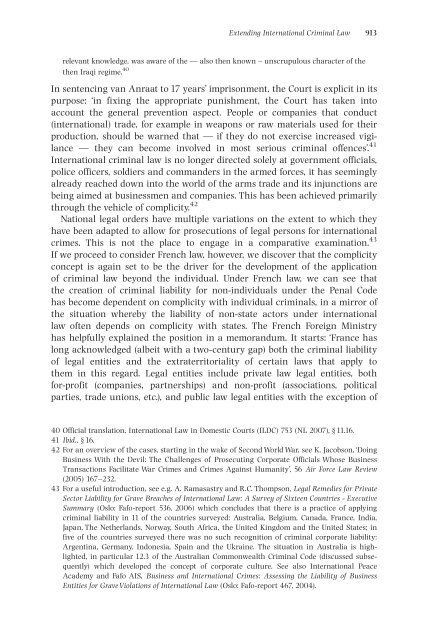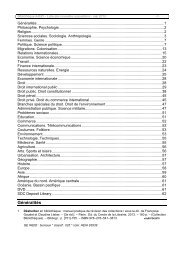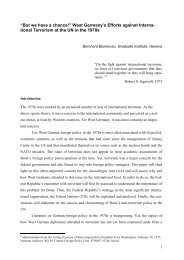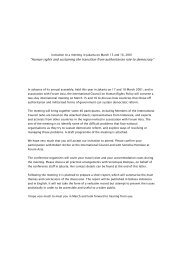Extending International Criminal Law beyond the Individual to ...
Extending International Criminal Law beyond the Individual to ...
Extending International Criminal Law beyond the Individual to ...
Create successful ePaper yourself
Turn your PDF publications into a flip-book with our unique Google optimized e-Paper software.
<strong>Extending</strong> <strong>International</strong> <strong>Criminal</strong> <strong>Law</strong> 913<br />
relevant knowledge, was aware of <strong>the</strong> ç also <strong>the</strong>n known ^ unscrupulous character of <strong>the</strong><br />
<strong>the</strong>n Iraqi regime. 40<br />
In sentencing van Anraat <strong>to</strong> 17 years’ imprisonment, <strong>the</strong> Court is explicit in its<br />
purpose: ‘in fixing <strong>the</strong> appropriate punishment, <strong>the</strong> Court has taken in<strong>to</strong><br />
account <strong>the</strong> general prevention aspect. People or companies that conduct<br />
(international) trade, for example in weapons or raw materials used for <strong>the</strong>ir<br />
production, should be warned that ç if <strong>the</strong>y do not exercise increased vigilance<br />
ç <strong>the</strong>y can become involved in most serious criminal offences’. 41<br />
<strong>International</strong> criminal law is no longer directed solely at government officials,<br />
police officers, soldiers and commanders in <strong>the</strong> armed forces, it has seemingly<br />
already reached down in<strong>to</strong> <strong>the</strong> world of <strong>the</strong> arms trade and its injunctions are<br />
being aimed at businessmen and companies. This has been achieved primarily<br />
through <strong>the</strong> vehicle of complicity. 42<br />
National legal orders have multiple variations on <strong>the</strong> extent <strong>to</strong> which <strong>the</strong>y<br />
have been adapted <strong>to</strong> allow for prosecutions of legal persons for international<br />
crimes. This is not <strong>the</strong> place <strong>to</strong> engage in a comparative examination. 43<br />
If we proceed <strong>to</strong> consider French law, however, we discover that <strong>the</strong> complicity<br />
concept is again set <strong>to</strong> be <strong>the</strong> driver for <strong>the</strong> development of <strong>the</strong> application<br />
of criminal law <strong>beyond</strong> <strong>the</strong> individual. Under French law, we can see that<br />
<strong>the</strong> creation of criminal liability for non-individuals under <strong>the</strong> Penal Code<br />
has become dependent on complicity with individual criminals, in a mirror of<br />
<strong>the</strong> situation whereby <strong>the</strong> liability of non-state ac<strong>to</strong>rs under international<br />
law often depends on complicity with states. The French Foreign Ministry<br />
has helpfully explained <strong>the</strong> position in a memorandum. It starts: ‘France has<br />
long acknowledged (albeit with a two-century gap) both <strong>the</strong> criminal liability<br />
of legal entities and <strong>the</strong> extraterri<strong>to</strong>riality of certain laws that apply <strong>to</strong><br />
<strong>the</strong>m in this regard. Legal entities include private law legal entities, both<br />
for-profit (companies, partnerships) and non-profit (associations, political<br />
parties, trade unions, etc.), and public law legal entities with <strong>the</strong> exception of<br />
40 Official translation, <strong>International</strong> <strong>Law</strong> in Domestic Courts (ILDC) 753 (NL 2007), x 11.16.<br />
41 Ibid., x 16.<br />
42 For an overview of <strong>the</strong> cases, starting in <strong>the</strong> wake of Second World War, see K. Jacobson,‘Doing<br />
Business With <strong>the</strong> Devil: The Challenges of Prosecuting Corporate Officials Whose Business<br />
Transactions Facilitate War Crimes and Crimes Against Humanity’, 56 Air Force <strong>Law</strong> Review<br />
(2005) 167^232.<br />
43 For a useful introduction, see e.g. A. Ramasastry and R.C. Thompson, Legal Remedies for Private<br />
Sec<strong>to</strong>r Liability for Grave Breaches of <strong>International</strong> <strong>Law</strong>: A Survey of Sixteen Countries - Executive<br />
Summary (Oslo: Fafo-report 536, 2006) which concludes that <strong>the</strong>re is a practice of applying<br />
criminal liability in 11 of <strong>the</strong> countries surveyed: Australia, Belgium, Canada, France, India,<br />
Japan, The Ne<strong>the</strong>rlands, Norway, South Africa, <strong>the</strong> United Kingdom and <strong>the</strong> United States; in<br />
five of <strong>the</strong> countries surveyed <strong>the</strong>re was no such recognition of criminal corporate liability:<br />
Argentina, Germany, Indonesia, Spain and <strong>the</strong> Ukraine. The situation in Australia is highlighted,<br />
in particular 12.3 of <strong>the</strong> Australian Commonwealth <strong>Criminal</strong> Code (discussed subsequently)<br />
which developed <strong>the</strong> concept of corporate culture. See also <strong>International</strong> Peace<br />
Academy and Fafo AIS, Business and <strong>International</strong> Crimes: Assessing <strong>the</strong> Liability of Business<br />
Entities for GraveViolations of <strong>International</strong> <strong>Law</strong> (Oslo: Fafo-report 467, 2004).



![Download [pdf] - The Graduate Institute, Geneva](https://img.yumpu.com/23370020/1/190x248/download-pdf-the-graduate-institute-geneva.jpg?quality=85)












